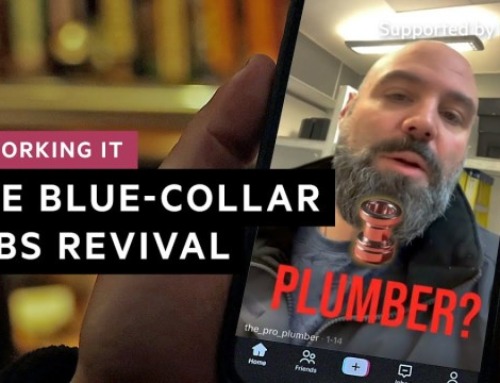Lab Weekly — 08/01/2025 More thoughts on Hollywood x AI; A new Floor 9 episode; Plus, the latest AI news about AI browsers, stablecoins, Fortnite activations, and more must-know news and stats
Want this newsletter in your inbox every week? Sign up for our mailing list here

This week, Amazon’s investment in Fabel Studio, a startup behind an AI streaming platform called “Showrunner” that lets paying subscribers use AI to create animated shows or build on existing IP, is a good indicator of how fast things are changing in Hollywood in regards to AI creative tools. So I updated my article last week with some new examples and additional musings on this topic. Please scroll to the end to read.

Three key ways that AI will reshape how travelers plan and enjoy their trips
How Beauty & Wellness Enter a Post-Viral Era
As trend fatigue sets in, consumers are trading fleeting fads for wellness rituals, athlete role models, and AI-aided self-discovery
Airbnb’s Rebranding & What It Says About the Service Economy
The issue with scaling local services and experiences, and how AI might play a part in Airbnb’s future

Welcome back to another episode of Floor 9. For this episode, host Tom Trudeau chatted with Adam Simon and Richard Yao from the Lab’s strategy team about our latest insights on travel. Together, they discussed some of the biggest trends in the travel and hospitality industry in 2025, including the financialization of the travel industry, the increasing use of AI to aid trip planning, and the increasing allure of intentional underplanning and flexible travel. All these topics ladder up to a discussion about the future of a “connected trip” experience that is being shaped by shifting consumer expectations and AI adoption.
If you enjoyed the episode, please consider giving us a five-star review on Apple Podcast. Follow the Lab on LinkedIn and on Medium for our latest insights. Thanks for listening!

Google is rolling out a new AI-powered feature in Chrome that generates store review summaries to help U.S. shoppers quickly assess retailers based on factors like product quality, pricing, and customer service. Initially available in English on desktop, the tool pulls data from review partners like Trustpilot, Yotpo, and Bazaarvoice and appears via a pop-up next to the browser’s address bar.
This update is part of Google’s broader effort to make Chrome more competitive amid rising AI-enabled browser challengers and to position itself as a more robust shopping platform. With everyone from OpenAI to Microsoft releasing AI browsers that rethink the web browsing experience from the ground up with AI as a key part of the user interface, Chrome’s shopping-oriented update here feels incremental and safe by comparison.
Of course, the rise of AI-first browsers also raises existential questions for Google Search itself. If AI browsers can summarize, synthesize, and take action across the web, they may eventually bypass traditional search altogether. Google’s slow drip of AI features suggests it’s aware of this risk but struggling to transition its browser from a passive gateway into an active agent. While Google might have successfully defended its search business from the AI search startups for now, its dominant position in online advertising may soon be in jeopardy as search behavior continues to be reshaped by AI chatbots.
Related: Microsoft Edge is now an AI browser with launch of ‘Copilot Mode’ [TechCrunch]; Opera’s new AI browser promises to write code while you sleep [The Verge]
JPMorgan and Coinbase Strike Deal to Link Bank Accounts and Crypto Wallets [Bloomberg]
Following the regulatory shift spurred by the latest cryptocurrency legislation, particularly the stablecoin bill known as the GENIUS Act that was signed into law a few weeks ago, JPMorgan Chase and Coinbase have entered a formal partnership to enable Chase customers to directly link their bank accounts to Coinbase wallets, along with the ability to use Chase credit cards and rewards points for crypto purchases.
This marks the first time a major U.S. credit card rewards program lets users fund a crypto wallet directly. We expect more banks to follow suit and strike similar partnerships, now that stablecoins have been granted legal legitimacy to be integrated into mainstream banking operations.
Related: PayPal to roll out ‘pay with crypto’ feature for merchants [Bloomberg]; The GENIUS Act is designed to regulate stablecoins in the US; here is how it will work [WEF]
‘Weapons’ Horror Film Launches Fortnite Tie-In Event From Warner Bros [Variety]
Warner Bros. is going all in on Fortnite activations to promote their new releases this year. Following the success of the Sinners tie-in event with the popular online game, the studio is teaming up again with creative agency Sawhorse to set up more Fortnite events for not only Weapons, its hotly anticipated horror movie opening in early August, but also the new movie by Paul Thomas Anderson, in order to reach the game’s over 110 million monthly active users. The goal, as Variety reports, is to help the studio push boundaries beyond regular media buys for trailers and reach audiences that traditional media channels no longer reach.
Related: New movie by Paul Thomas Anderson, One Battle After Another, is coming to Fortnite [The Gamer]; ‘Sinners’ game launches on Fortnite based on Ryan Coogler movie [MSN]; Dolce&Gabbana returns to Roblox with a virtual experience [D&G]
Situational Awareness: Waymo, Avis plan dallas robotaxi launch in multiyear deal [Bloomberg]
Waymo announced it will launch a robotaxi service in Dallas in 2026, partnering with Avis Budget Group to handle fleet operations, infrastructure, and maintenance. The multiyear deal signals plans for expansion to additional cities and highlights Waymo’s evolving position as both partner and competitor to Uber in the autonomous ride-hailing space.
For Avis competitors like Hertz and Enterprise, this raises the stakes in the race to secure long-term EV and AV fleet partnerships — especially as car rental firms seek new revenue streams amid declining traditional rentals. Those without a foothold in autonomous mobility risk being left behind.
Spotify takes a swing at gaming with a mini golf game ahead of ‘Happy Gilmore 2’ release [TechCrunch]
This collaboration between Spotify and Netflix to launch a mobile mini golf game for Happy Gilmore 2 marks a strategic evolution in how entertainment brands use casual games to drive fan engagement. For entertainment marketers, this signals a growing opportunity to use bite-sized, branded game experiences as attention gateways, especially on platforms not traditionally associated with gaming.
Alibaba previews its first AI-powered glasses [SCMP]
While Meta continues to lead the smart glasses market worldwide — Bloomberg reports that the company says the sales of Ray-Ban Meta Glasses more than tripled year-over-year in the first half of 2025 — the Chinese tech companies are also eagerly joining the race for mixed reality devices. This marks Alibaba’s debut in the smart glasses market, which has seen heightened local competition as domestic firms like Rokid and Xreal have rushed to release new products in recent months.
TikTok Live and iHeartRadio Launch New Singing Competition Show [Rolling Stone]
TikTok and iHeartRadio have indeed launched a live-streamed singing competition called “Next Up: LIVE Music”, running from July 28 through September. U.S.-based emerging artists will compete via TikTok LIVE and advance in the competition based on real‑time fan engagement (e.g. likes, views, comments, and shares) combined with scores from a judging panel, culminating in a Top 12 finale show at the iHeartRadio Theater in Burbank. Overall, this could be an interesting experiment in a hybrid format that fuses audience interactivity with traditional reality competition shows, pushing live media into truly participatory territory where the fans will be actively determining the outcome in real time.
- “Private label brands” are those offering products made and sold by retailers under their own name, a.k.a., the house brand, often offering a lower-cost alternative to national “name” brands, which is appealing to cost-conscious Gen Z consumers. By 2026, the cohort is projected to allocate 18% of their shopping budget to private label brands, per a Retail Dive report.
- Some new Q2 earning reports from the streaming land: Netflix raked in $11.08 billion in revenue over the past few months, marking a 16% year-over-year increase, per The Verge, and Netflix says it’s on track to “double” its advertising revenue this year. Meanwhile, Variety reports that YouTube’s ad revenue hit $9.8 billion in Q2, up 13% year over year and beating analyst estimates by $200 million, with more brands steadily shifting ad budgets away from traditional broadcast TV and toward YouTube.
- Another eye-popping number from an earnings report, EssilorLuxottica, the parent company of Ray-Ban, posted a better-than-expected Q2 revenue increase at 7.3%. Bloomberg reports that the company says the sales of Ray-Ban Meta Glasses more than tripled year-over-year in the first half of 2025, and it expects “a very fast ramp-up” of Oakley Meta.
If you find our insights valuable and would like to have a deeper conversation on technology and media innovations, or need to sound smarter in a client meeting or a pitch, please feel free to reach out to Ryan Miller, our Director of Partnerships, at ryan.miller@ipglab.com.
If you liked this edition of Lab Weekly by IPG Media Lab, why not share it?
Lab Weekly — 08/01/2025 was originally published in IPG Media Lab on Medium, where people are continuing the conversation by highlighting and responding to this story.







